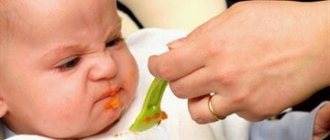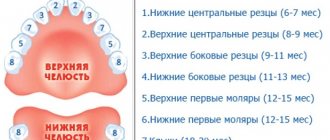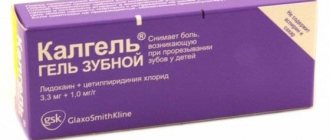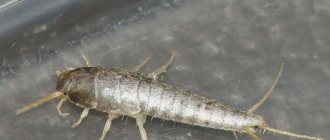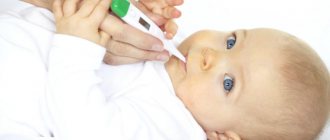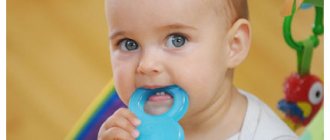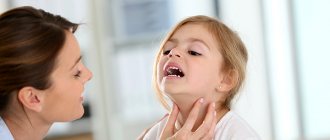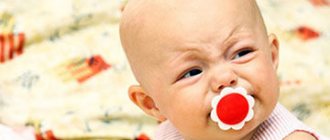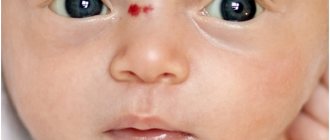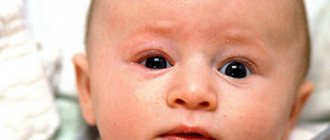Teething in children can manifest itself with various signs (moody, fever, excessive drooling, sleep disturbances, runny nose, change in stool) or be asymptomatic.
It is important for parents to know what to do if a high temperature persists for a long time during teething and other pathological symptoms are observed (diarrhea, vomiting, snot). It is also important to know how many days hyperthermia can be normal and when you need to seek advice from a specialist, rather than trying to cope with the problem yourself.
Why does the temperature rise
During the period of active teething, inflammation with swelling and hyperemia of the gums is observed in the growth zone.
This process is accompanied by:
- a significant decrease in local immunity in the oral cavity;
- a decrease in general immunological reactivity in children;
- release of biologically active substances.
Therefore, when teething, general malaise, lethargy, drowsiness, moodiness and increased body temperature occur: from low-grade fever to 39 C and above.
The immaturity of all organs and systems of the baby - the immune, cardiovascular, nervous and thermoregulation systems and the disruption of their interaction - play a certain role in the appearance of high temperature in children.
In infants, there is instability in the processes of heat release and accumulation, therefore, when any changes occur in the body (physiological or pathological), the temperature often rises during teething.
During active teething, children experience active salivation; this is due to the inclusion of another factor in the body’s natural defense against possible infection during the development of an inflammatory process in the oral cavity.
Saliva is an active bactericidal and anti-inflammatory agent, and increasing its production by the salivary glands significantly reduces the risk of infection by various pathogenic microorganisms and viruses, as well as the transition of the inflammatory process to neighboring tissues.
The appearance of mucous discharge from the nose (runny nose or snot), loose watery stools, is associated with physiological changes in the nasopharynx and intestines, as well as damage to the nasal cavity, pharynx and intestines by pathogenic bacteria and viruses as a result of a significant decrease in the baby’s immune reactivity.
The complex of all these factors causes an increase in the baby’s temperature during teething.
In most cases, all pathological signs of teething do not require treatment, except for prolonged hyperthermic syndrome in children (high temperature) or the accumulation of an active infectious process (respiratory viruses or intestinal infections).
Teeth rings
As mentioned above, the baby’s gums may itch, which is why he may constantly try to chew something. In this case, buy your child a special rubber ring. The soft material is safe and comfortable for baby to chew on lightly. Chill it slightly in the refrigerator before using (be careful—excessively cold material can be harmful to children's gums). Make sure that the chew toy is always disinfected. Without a doubt, this is something that will ease your baby's painful teething symptoms3.
To what maximum can the temperature rise?
Parents are often concerned with the question: “To what maximum numbers can the temperature rise, and how many days does the febrile temperature (39-40 C) last during teething?”
Often, the period of active eruption of the first teeth at the age of 6 to 10 months (incisor group) and at 1.5 years (with the eruption of central molars), the temperature can rise to high figures and often reaches 38-39 degrees.
During this period, children experience pain, malaise, and weakness that were not typical before, so their behavior changes, sleep disturbances and refusal to eat are noted, which only aggravates the temperature reaction.
First of all, the child needs rest, peace and healthy sleep, because temperature, on the one hand, is a protective reaction, and on the other, a debilitating process, which, if unfavorable, can cause overstrain of all organs and systems with the development of pathological reactions: vomiting, tachycardia and even febrile seizures. Read more about seizures at high temperatures →
When the temperature rises to febrile levels (above 38.5 degrees Celsius) and tends to increase, it must be brought down by taking antipyretic drugs (Nurofen, Efferalgan, Panadol, Cefekon, Ibufen) in the form of syrup or rectal suppositories.
You cannot additionally stimulate the baby’s nervous system with games, loud music, laughter, or bright light - the body needs peace and rest during this period in order to cope with the load on its own.
If convulsive reactions appear against the background of an increase in temperature - tics, twitching or muscle contractions - the temperature must be brought down immediately at any level. Your home medicine cabinet must have Nurofen or another antipyretic. You also need to call an ambulance or go to the emergency room.
How long can a fever last when a baby is teething?
On average, the duration of the temperature reaction during teething is from 1 to 3 days, but for each child this process occurs individually.
High fever persists for a long time in children:
- with a pronounced local inflammatory reaction - persistent swelling, hemorrhages in the mucous membrane, hyperemia of the gums;
- with active eruption of several teeth;
- if there are other inflammatory or infectious-inflammatory diseases in the body - kidneys, lungs, blood, liver, heart, nervous system.
The temperature can also rise when another infectious-inflammatory process occurs:
- in the oral cavity - stomatitis, gingivitis;
- in the nasopharynx - pharyngitis, tonsillitis, rhinitis, adenoiditis, which are manifested by a runny nose (snot) and dry cough;
- in the respiratory tract - laryngotracheitis, bronchitis;
- in the intestines - enteritis, dysbacteriosis.
You need to invite a doctor to your home or see a pediatrician when the temperature is:
- rises to high numbers (39 and above);
- is poorly controlled by antipyretic drugs (Nurofen, Efferalgan, Ibufen) and/or increases again within a short period of time after taking them;
- accompanied by local pathological signs - snot, cough, diarrhea, vomiting or regurgitation;
- is manifested by a significant change in the baby’s well-being - weakness, lethargy, drowsiness, monotonous constant crying.
Do not hesitate to disturb the doctor once again, because timely diagnosis and proper treatment of any pathologies in infants is the key to good health of the baby in the future.
If the temperature rises to high numbers, it is necessary to promptly reduce it with antipyretics (Panadol, Nurofen or Ibufen) before the doctor arrives or goes to the appointment, especially if it has been elevated for several days and is accompanied by other signs: snot, diarrhea, poor health.
Indications and contraindications for use
Painful teething in a baby always worries his parents very much, who quite naturally strive to bring relief to the child as soon as possible. However, Nurofen is a serious medicine, and not just a sweet suspension, and therefore you should definitely consult your pediatrician before using it.
As for indications, today Nurofen is successfully used to relieve pain of completely different symptoms and diseases, one of which is pain in the teeth and gums.
It is not recommended to give Nurofen to a child to relieve pain for longer than five days.
It follows that using this remedy to overcome teething pain in children is quite acceptable. The manufacturer reminds us that giving Nurofen to a child to relieve pain for longer than five days is not recommended. Knowing that painful teething can take a noticeably long time, we can come to the conclusion that Nurofen is only suitable as a temporary solution for gum pain relief.
There are also a number of medical contraindications according to which the described medicine should not be given to a baby. Thus, Nurofen is prohibited for use if:
- excessive sensitivity to any of the components of Nurofen;
- presence of bronchial asthma;
- bleeding or perforated ulcer in the gastrointestinal tract;
- gastrointestinal ulcers;
- liver failure;
- blood clotting disorder;
- fructose intolerance;
- child's body weight up to 5 kg.
Note! In addition to strict contraindications, there are also certain precautions due to the individuality of each child's body. Consultation with a doctor or pharmacist when purchasing Nurofen is required.
In what cases should you urgently call a doctor?
Parents need to know in what cases, when the temperature rises due to teething syndrome, they urgently need to call a doctor or an ambulance:
- when the temperature rises to 39.5 – 40 °C;
- if, against the background of an increase in temperature, the child experiences passivity, capriciousness, pale skin, a “marbled” color or an ashen tint of the skin, the baby groans, and a feeling of cold extremities appears;
- the high temperature lasts for more than two to three days, does not decrease well after taking antipyretic drugs (Nurofen or Paracetamol and its analogues), and there is a significant disturbance in the child’s well-being;
- when convulsive readiness appears in children - muscle tension and twitching against the background of an increase in temperature or with a history of febrile convulsions;
- when other pathological signs appear against the background of temperature: runny nose (snot), cough, diarrhea, regurgitation, vomiting, rash.
What you should never do:
- if possible, do not interfere with the course of events - do not give the baby a cracker or a crust of bread to distract the baby - this can scratch the gums and cause infection of the wound;
- do not massage the gums or try to make the tooth appear earlier; do not cut the swollen tissue;
- Do not wipe the child with alcohol or vinegar - this can aggravate the intoxication of the body;
- In order to reduce the temperature, use adult forms of antipyretic drugs, combination drugs, it is strictly forbidden to use “Analgin” or “Aspirin”, you can take only approved antipyretic drugs (Efferalgan, Panadol, Nurofen).
Regular moments during the period of rising temperature
Most often, an increase in temperature during teething syndrome is observed during the eruption of molars, upper canines, or the simultaneous eruption of several incisors.
If unpleasant and complex manifestations appear during teething, the baby, first of all, needs:
- Care, warmth, love and tenderness , parents should not be nervous and take it out on their child with increased moodiness, sleep disturbances and appetite.
- Most babies calm down at their mother’s breast, so you shouldn’t deny the baby the desire to nurse often , even if the baby is not hungry. You need to feed the baby with regular food that he has already taken before (mother’s breast, adapted formula and complementary foods); nothing new should be introduced into the diet.
- Walking in the fresh air is contraindicated only if there is a significant increase in temperature, a pronounced disturbance in health and the addition of pathological signs indicating the layering of infectious and inflammatory processes (cough, snot, diarrhea, vomiting). Therefore, you need to walk more in the fresh air, using a stroller or ergo-backpack.
- Comfortable conditions for sleep and rest - cool room temperature (17-20°C), optimal humidity and fresh air flow, it is advisable to frequently ventilate the room.
- Wiping the face and whole body with a tampon soaked in cool water, and washing after defecation are mandatory - when the temperature rises, bathing the baby is not advisable.
The most important points when an increase in body temperature occurs during “teething syndrome” is to prevent the accumulation of respiratory and intestinal infections, to determine their main symptoms: cough, snot, diarrhea, vomiting, lethargy and weakness of the child.
It is also necessary to develop a clear algorithm of actions. Remember that when a temperature reaction occurs, you need: timely consultation with a specialist, taking antipyretics (Nurofen or Efferalgan), creating a comfortable atmosphere and microclimate in the room where the child is constantly located.
Author: Olga Ivanovna Sazonova, pediatrician
